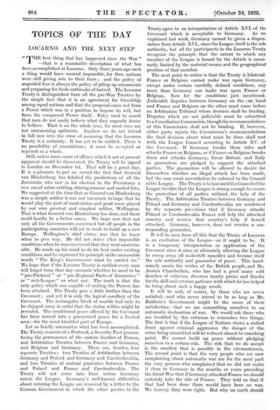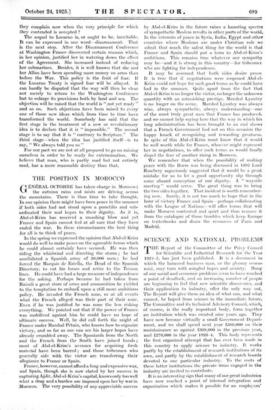TOPICS OF THE DAY
LOCARNO AND THE NEXT STEP
0 THE best thing that has happened since the War " —that is a reasonable- description of what has been accomplished at Locarno. Only three years ago such a thing would have seemed impossible, for then nations were still giving rein to their fears ; and the policy of unguided fear is always the policy of piling up armaments and preparing for fresh outbreaks of hatred. The Locarno Treaty is distinguished from all the pre-War Treaties by the simple fact that it is an agreement for friendship among equal nations and that the proposal came not from a Power which was in a position to impose its will, but from the conquered Power itself. Paley used to assert that men do not easily believe what they urgently desire to believe. That is on the whole true, for most men are not unreasoning optimists. Anyhow we do not intend to fall now into the error of assuming that the Locarno Treaty is a certainty. It has yet to be ratified. There is no possibility of emendation ; it must be accepted or rejected as a whole.
Still, unless some cause of offence which is not at present apparent should be discovered, the Treaty will be signed in London on December 1st. That will be a great day. It is a pleasure to put on record the fact that General von Hindenburg has falsified the predictions of all the Jeremiahs who saw in his election to the Presidency a new era of sabre-rattling, shining armour and mailed fists. We suggested at the time that as General von Hindenburg was a simple soldier it was not too much to hope that he would play the part of moderation and good sense played by our own greatest and simplest soldier, Wellington. That is what General von Hindenburg has done, and there could hardly be a better omen. We hope now that not only all the Governments concerned but all people in the participating countries will set to work to build up a new Europe. Wellington's chief virtue was that he knew when to give way. He did not strive after impossible conditions when he was convinced that they were unattain- able. He made up his mind to do his best under existing conditions, and he expressed his principle ii,the memorable words " The King's Government must be carried on." We hope that if the Locarno Treaty is ratified every man will forget from that day onwards whether he used to be " pro-Protocol " or " pro-Regional Pacts of Guarantee " or " anti-League " or what not. The truth is that the only policy which was capable of uniting the Powers has been attained. The Treaty goes a little further than the Covenant ; and yet it is only the logical corollary of the Covenant. The rectangular block of marble had only to be chipped away in order that the statue within might be revealed. The conditional peace offered by the Covenant has been turned into a guaranteed peace for a limited area—for the most troubled part of Europe.
Let us briefly summarize what has been accomplished. The Treaty consists of a Protocol, a Security Pact guaran- teeing the permanence of the eastern frontier of France, and Arbitration Treaties between France and Germany, and Belgium and Germany. There are, besides, four separate Treaties ; two Treaties of Arbitration between Germany and Poland and Germany and Czechoslovakia, and two Treaties of mutual guarantee between France and Poland and France and Czechoslovakia. The Treaty will not come into force unless Germany enters the League. Germany's well-known difficulties about entering the League are removed by a letter to the German Government in which the other parties to the Treaty agree to an interpretation of Article XVI. of the Covenant which is acceptable to Germany. As we explained last week, Germany cannot be given a dispen- sation from Article XVI., since the League itself is the sole authority, but all the participants to the Locarno Treaty recognize the principle that the extent to which any member of the League is bound by the Article is neces- sarily limited by the material means and the geographical position of that member.
The next point to notice is that the Treaty is bilateral. France or Belgium cannot make war upon Germany, except under certain carefully defined conditions, any, more than Germany can make war upon France or Belgium. Now for the conditions just mentioned. Judiciable disputes between Germany on the c ne hand and France and Belgium on the other must come before an Arbitration Tribunal whose decision shall be binding. Disputes which are not judiciable must be submitted to a Conciliation Commission, though the recommendations of this Commission shall not be binding. If, however, either party rejects the Commission's recommendations the final decision about what must be done shall rest with the League Council according to Article XV. of the Covenant. If Germany breaks these rules and attacks France or Belgium, or if France or Belgium breaks them and attacks Germany, Great Britain and Italy as guarantors are pledged to support the attacked, parties. The guarantors will be allowed to decide for themselves whether an illegal attack has been made,; but the case must nevertheless be referred to the Council! of the League. The Treaty is to last until the Council of the, League decides that the League is strong enough to ensure the protection of all parties without the help of the Treaty. The Arbitration Treaties between Germany and Poland and Germany and Czechoslovakia are reinforced by the separate provisions that if Germany attacks Poland or Czechoslovakia France will help the attacked country and receive that country's help if herself attacked. Germany, however, does not receive a cor- responding guarantee.
It will be seen from all this that the Treaty of Loearno, is an exaltation of the League--as it ought to be. It' is a temporary interpretation or application of the Covenant since it aims at ultimately allowing the League to sweep away all makeshift remedies and become itself the sole authority and guarantor of peace. This hand- somely meets the wishes of the British people, and Mr. Austen Chamberlain, who has had a good many cold douches of criticism, deserves hearty praise and thanks for the skill and extreme patience with which he has helped to bring about such a happy result.
It will be said, of course, by those who are never satisfied—and who never intend to be so long as Mr.' Baldwin's Government might be the cause of their satisfaction—that we are committing ourselves to ant automatic declaration of war. We would ask those who are troubled by this criticism to remember two things., The first is that if the League of Nations shows a united' front against criminal aggression the danger of the' crime being committed will be reduced almost to vanishing point. We cannot build up peace without pledging ourselves to a certain risk. The risk that we do accept is the smallest that is possible in the circumstances, The second point is that the very people who are now complaining about automatic war are for the most part the very persons who complained that we did not make it clear to Germany in the months or years preceding the Great War that if Germany attacked France we should certainly take the side of France. They told us that if that had been done there would have been no war. We daresay they were right. But why on earth should they complain now when the very principle for which they contended is accepted ?
The sequel to Locarno is, or ought to be, inevitable. It can be expressed in one word—disarmament. That is the next step. After the Disarmament Conference at Washington France discovered certain reasons which, in her opinion, justified her in watering down the effect of the Agreement. She increased instead of reducing her submarines. Besides, it is well known that she and her Allies have been spending more money on arms than before the War. This policy is the fruit of fear. If the Locarno Treaty is signed fear will be allayed. It can hardly be disputed that the way will then be clear not merely to return to the Washington Conference but to enlarge its provisions both by land and sea. The objection will be raised that the world is "not yet ready " and so on. Such objections have been raised to every one of those new ideas which from time to time have transformed the world. Somebody has said that the first stage in the treatment of a new or revolutionary idea is to declare that it is " impossible." The second stage is to say that it is " contrary to Scripture." The third stage—when the idea has justified itself—is to say, " We always told you so."
For our part we are not at all prepared to go on ruining ourselves in order to be ready for extermination. We believe that man, who is partly mad but not entirely mad, has a more reasonable destiny than that.































































 Previous page
Previous page